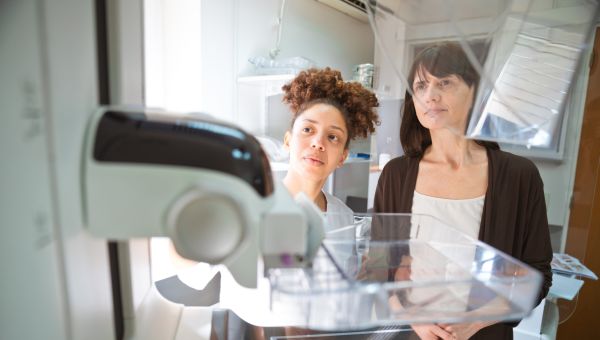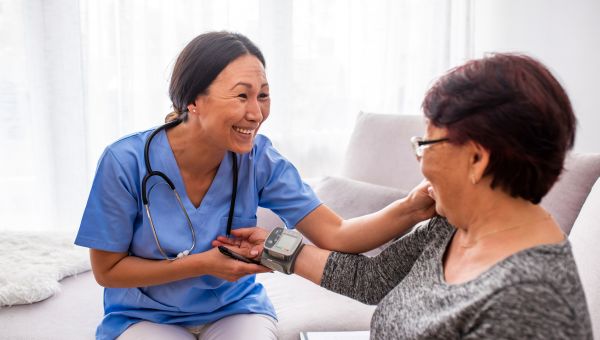6 things you can do at the gynecologist’s office that aren't Pap smears
An OBGYN can talk to you about much more than your sexual and reproductive health.
Updated on November 7, 2024

You may have a set checklist of things you discuss at your regular gynecologist visits. That may include Pap smears, human papillomavirus (HPV) testing, mammograms, sexually transmitted infections (STIs), birth control, pregnancy planning, or menopause. But the conversation can be about more than your sexual and reproductive health. An OBGYN can provide information and… Show More
You may have a set checklist of things you discuss at your regular gynecologist visits. That may include Pap smears, human papillomavirus (HPV) testing, mammograms, sexually transmitted infections (STIs), birth control, pregnancy planning, or menopause. But the conversation can be about more than your sexual and reproductive health. An OBGYN can provide information and advice on many wellness topics, including heart health, weight control, and osteoporosis.
If you have an appointment coming up, here are six topics you might discuss.
Show Less
Cancer screenings
A typical Pap smear, which is recommended every 3 to 5 years depending on your age and risk, can detect cervical cancer. But an OBGYN can also discuss ovarian, endometrial, or breast cancer, especially if you have a family history of these diseases.
If you’re having any pelvic or abdominal… Show More
A typical Pap smear, which is recommended every 3 to 5 years depending on your age and risk, can detect cervical cancer. But an OBGYN can also discuss ovarian, endometrial, or breast cancer, especially if you have a family history of these diseases.
If you’re having any pelvic or abdominal pain, bloating, difficulty eating, or problems with urinating, especially for more than 12 days each month, discuss it with an OBGYN. Although there could be many reasons for these symptoms, they may recommend an ultrasound (imaging test) and blood work to check for markers of ovarian cancer.
The endometrium is the lining of the uterus. Symptoms of endometrial cancer include unusual vaginal discharge, unusual bleeding between periods (or after you’ve gone through menopause), pelvic pain, or unexplained weight loss. If you feel a mass in your pelvic region, that may indicate an issue, too. Discuss these with your OBGYN to see if you should be checked for cancer. If symptoms need more exploring, imaging may be recommended to get a closer look at the uterus. A procedure like a hysteroscopy, biopsy, or a dilation and curettage (D&C) could be needed to remove tissue for examination and testing.
If you are at average risk for breast cancer, your OBGYN should discuss screening for breast cancer with you when you reach age 40, according to the American College of Obstetricians and Gynecologists. This is an ongoing conversation that should be continued at annual wellness visits. Your OBGYN can go over your personal risk and the screening options available, along with their benefits and potential risks.
Show Less
Weight management
A weight check is considered routine at every OBGYN appointment, though you can ask not to be weighed if you prefer. Either way, the OBGYN will likely to start a conversation about healthy eating and getting plenty of physical activity in your day, says Mariko Shelton, MD, an OBGYN in Dearborn… Show More
A weight check is considered routine at every OBGYN appointment, though you can ask not to be weighed if you prefer. Either way, the OBGYN will likely to start a conversation about healthy eating and getting plenty of physical activity in your day, says Mariko Shelton, MD, an OBGYN in Dearborn Heights, Michigan.
To know: Body mass index (BMI) is a widely used measurement for weight management, but it is also considered flawed. That's because it doesn’t account for muscle mass, bone density, race, or sex. Your OBGYN may discuss it to give you an idea of where you land on the spectrum from underweight to obese.
Show Less
High blood pressure concerns
It’s standard practice for OBGYNs to take blood pressure readings at checkups. It’s also fairly common for people to be anxious during this process and those nerves may result in somewhat higher numbers.
If that’s the case, your OBGYN may suggest you see another healthcare provider (HCP) for follow-… Show More
It’s standard practice for OBGYNs to take blood pressure readings at checkups. It’s also fairly common for people to be anxious during this process and those nerves may result in somewhat higher numbers.
If that’s the case, your OBGYN may suggest you see another healthcare provider (HCP) for follow-up or that you start tracking your blood pressure at home. In this situation, ask an HCP for information on how to get an accurate measure on your own.
If an OBGYN suspects you have high blood pressure, they may recommend lifestyle changes to help control your numbers, including:
- Limiting alcohol
- Maintaining a healthy weight
- Exercising regularly
- Quitting smoking
- Following a heart-healthy, low-sodium diet like the Dietary Approaches to Stop Hypertension (DASH) diet
- Managing stress levels
Medications may also be recommended in combination with these healthy lifestyle habits. Your OBGYN can discuss options with you.
Show Less
Chronic disease check-in
It’s always helpful to let the OBGYN know about any chronic conditions you have, such as diabetes, asthma, or a mental health issue. But this is especially crucial if you’re planning to become pregnant. This information can help guide treatment or management recommendations.
Whether you’re on a… Show More
It’s always helpful to let the OBGYN know about any chronic conditions you have, such as diabetes, asthma, or a mental health issue. But this is especially crucial if you’re planning to become pregnant. This information can help guide treatment or management recommendations.
Whether you’re on a treatment plan already or you’re looking to start one, Dr. Shelton says you’ll want to get these conditions under control if you are planning to become pregnant.
Show Less
Smoking cessation help
If you are interested in quitting smoking—especially if you’re planning to become pregnant—you can seek help from an OBGYN.
“We can prescribe nicotine replacement or other medications that can help someone quit. We can also discuss other tactics for quitting,” says Shelton.
If you smoke, the OBGYN… Show More
If you are interested in quitting smoking—especially if you’re planning to become pregnant—you can seek help from an OBGYN.
“We can prescribe nicotine replacement or other medications that can help someone quit. We can also discuss other tactics for quitting,” says Shelton.
If you smoke, the OBGYN will go over the reasons you should quit. These include lowering your risk of heart disease, lung conditions, and cancer. For those who are pregnant, it includes reducing the chances of premature birth and many other complications, as well.
You'll also discuss your options for kicking smoking. Some people are able to quit immediately. Others need more time to think about why and when they want to quit, and to identify their smoking triggers. An OBGYN can discuss a realistic plan to quit smoking with you. They may refer you to smoking cessation programs and suggest products and medications, including some antidepressants, that can help minimize cravings.
Show Less
Bone health advice
Osteoporosis is the thinning and weakening of bones. It's five times more common in women than in men and the risk increases with age. That means that women and people assigned female at birth (AFAB) may need to be especially aware of their bone health.
If you’re concerned, you can talk to your… Show More
Osteoporosis is the thinning and weakening of bones. It's five times more common in women than in men and the risk increases with age. That means that women and people assigned female at birth (AFAB) may need to be especially aware of their bone health.
If you’re concerned, you can talk to your OBGYN about calcium and vitamin D supplements. An OBGYN can also order bone mineral density tests to look for signs of osteoporosis, says Shelton.
It’s recommended that all people AFAB who are 65 years and older have a bone density test. Those age 64 or younger who are at higher risk for osteoporosis (such as having gone through early menopause) should ask an HCP if they need a bone density test, according to the U.S. Department of Health and Human Services (HHS). Men and people assigned male at birth (AMAB) can get osteoporosis, too, and should speak with an HCP if they are over age 65 and have concerns about bone strength.
Whatever your age, you can always talk to an OBGYN about improving the health of your bones. It’s especially important if you are approaching menopause, since it's associated with bone loss. People in menopause should be aware that osteoporosis can raise the risk of frequent fractures. Osteoporosis can also cause a slight curving of the spine or decreased height.
Activities such as weight training, walking, yoga, and tai chi can help strengthen bones and improve balance and posture. You can also try eating calcium-rich foods such as leafy greens (like spinach and kale), low-fat dairy (like yogurt), fatty fish (such as salmon and sardines). If an HCP finds thinning bones during bone density testing, they may recommend lifestyle changes and/or medications to reduce the risk of fractures.
Show Less
Your OBGYN is there to help you
Shelton wants you to know that whatever the conditions you're concerned about, an OBGYN is there to help. Keeping track of your overall health is a key part of their care for you. “And if we feel that a topic is outside of our scope of practice, we will refer you to another provider,” she says.
“I… Show More
Shelton wants you to know that whatever the conditions you're concerned about, an OBGYN is there to help. Keeping track of your overall health is a key part of their care for you. “And if we feel that a topic is outside of our scope of practice, we will refer you to another provider,” she says.
“I frequently have patients with low back pain who I refer to physical therapy,” Shelton says. “I also have patients who have concerns about their mood, who I evaluate and refer to counseling or, if the issues are more complex, to psychiatry.”
Bottom line: If you have any concerns about any aspect of your health, remember that an OBGYN is an excellent resource. If they don’t know the answer, they can refer you to someone who does.
Show Less
Office of Disease Prevention and Health Promotion. Get a Bone Density Test. Last updated July 14, 2022.
More On


video

slideshow


video


video
